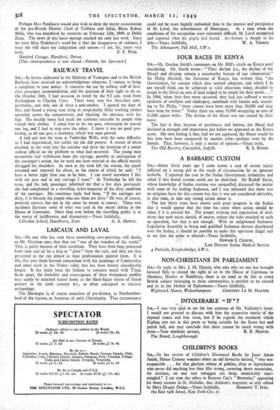RAILWAY TRAVEL
Snt,—As letters addressed to the Ministry of Transport and to the British Railways have received no acknowledgment whatever, I venture to bring a complaint to your notice. It concerns the use by railway staff-of first- class passenger accommodation, and the question of their right to do so. On October 24th, I had occasion to travel by the 9.2 a.m. train from Etchingham to Charing Cross. There were very few first-class com- partments, and only one of these a non-smoker. I opened the door of this, and found a young man lying in unspeakably filthy 'working clothes sprawled across the compartment, and blocking the entrance with his legs. His muddy boots had made the cushions unusable by people who valued their clothes. I asked him to let me pass, whereupon he moved one leg, and I had to step over the other. I knew it was no good pro- testing, as all one gets is insolence, which was soon proved.
A lady got into the train at Tunbridge Wells, with the same difficulty as I had experienced, but unlike me she did protest. A stream of abuse resulted, so she went into the corridor and drew the attention of a senior railway official on the platform to what had occurred. The young man meanwhile had withdrawn from the carriage, possibly in anticipation of the passenger's action, but he need not have worried as the official merely shrugged his shoulders. As soon as the train left the station, the youth returned and renewed his abuse, in the course of which he said: " I have a better right than you to be here. I can travel anywhere I like with my pass and in any carriage I want." At Tonbridge he left the train, and the lady passenger informed me that a few days previously she had complained to a travelling ticket-inspector of the dirty condition of the carriages. His courteous reply had been, " If the carriages are dirty, it is because the people who use them are dirty." He was, of course, perfectly correct, but not in the sense he meant to convey. These two incidents illustrate some of what was said in the recent debate in the House of Commons. More than ever before the travelling public is at the mercy of indifference and discourtesy.—Yours faithfully,
Lillesden School, Hawkhurst, Kent. A. A. Mowsx.






































 Previous page
Previous page